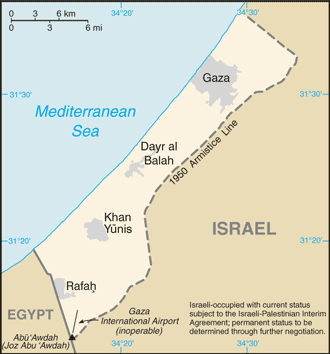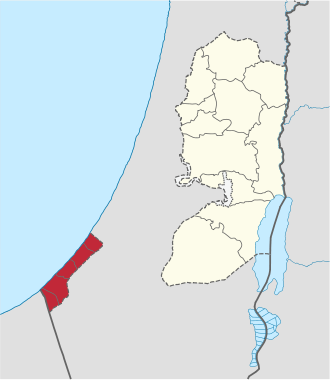Gaza Strip


The Gaza Strip is a self-governing stretch of land along the Mediterranean. The main city in the Gaza Strip is called Gaza. The strip is currently governed by Hamas, a group declared as terrorists by many western nations for its launching of rockets into Israel and attacks on civilians.
The territory is 41 kilometers (25 mi) long, and from 6 to 12 kilometers (3.7 to 7.5 mi) wide, with a total area of 365 square kilometers (141 sq mi). About 1.8 million Palestinians live on a surface of roughly 360 km², making Gaza the 3rd most densely populated area on Earth.
History
[edit | edit source]Gaza was formed in 1967 when Israel moved Jewish settlements and troops into Gaza. Israel controlled the Strip's borders, coastline and airspace until 2005, when it withdrew. An election was held in January 2006, which Hamas won. Since then, Israel has conducted several wars with Hamas due to alleged terrorist acts, causing much of the infrastructure of Gaza to be non functional.[1] It has been placed under an Israeli and U.S.-led international economic and political boycott since 2006.
Status
[edit | edit source]Anti-Israelis and Arab countries, as presented by the Arab-run Aljazeera, regard all of the lands that Israel won in its various wars instigated by the Arab countries which surround it, including the Palestinian territories including Gaza as occupied.[2] Human Rights Watch has declared at the UN Human Rights Council that it views Israel as a de facto occupying power in the Gaza Strip, even though Israel has no military or other presence, because the Oslo Accords authorize Israel to control the airspace and the territorial sea.[3][4][5]
In his statement on the 2008–2009 Israel–Gaza conflict, Richard Falk, United Nations Special Rapporteur wrote that international humanitarian law applied to Israel "in regard to the obligations of an Occupying Power and in the requirements of the laws of war."[6] Amnesty International, the World Health Organization, Oxfam, the International Committee of the Red Cross, the United Nations, the United Nations General Assembly, the UN Fact Finding Mission to Gaza, international human rights organizations, US government websites, the UK Foreign and Commonwealth Office, and a significant number of legal commentators (Geoffrey Aronson, Meron Benvenisti, Claude Bruderlein, Sari Bashi, Kenneth Mann, Shane Darcy, John Reynolds, Yoram Dinstein, John Dugard, Marc S. Kaliser, Mustafa Mari, and Iain Scobbie) maintain that Israel's extensive direct external control over Gaza, and indirect control over the lives of its internal population mean that Gaza remained occupied.[7][8] In spite of Israel's withdrawal from Gaza in 2005, the Hamas government in Gaza considers Gaza as occupied territory.[9]
Israel states that it does not exercise effective control or authority over any land or institutions in the Gaza Strip and thus the Gaza Strip is no longer subject to the former military occupation.[10][11] Foreign Affairs Minister of Israel Tzipi Livni stated in January 2008: "Israel got out of Gaza. It dismantled its settlements there. No Israeli soldiers were left there after the disengagement."[12] On January 30, 2008, the Supreme Court of Israel ruled that the Gaza Strip was not occupied by Israel in a decision on a petition against Israeli restrictions against the Gaza Strip which argued that it remained occupied. The Supreme Court ruled that Israel has not exercised effective control over the Gaza Strip since 2005, and accordingly, it was no longer occupied.[13]
In a legal analysis Hanne Cuyckens agrees with the Israeli position that Gaza is no longer occupied - "Gaza is not technically occupied, given that there is no longer any effective control in the sense of Article 42 of the Hague Regulations. ... Even though the majority argues that the Gaza Strip is still occupied, the effective control test at the core of the law of occupation is no longer met and hence Gaza is no longer occupied." She disagrees that Israel cannot therefore be held responsible for the situation in Gaza because: "Nonetheless Israel continues to exercise an important level of control over the Gaza Strip and its population, making it difficult to accept that it would no longer have any obligations with regard to the Strip. ... the absence of occupation does not mean the absence of accountability. This responsibility is however not founded on the law of occupation but on general international humanitarian law, potentially complemented by international human rights law".[14]
Avi Bell argues that Israel does not control the Gaza Strip for the purposes of the law of belligerent occupation or human rights duties: "The Naletilic decision of the International Criminal Tribunal for the Former Yugoslavia recited several factors indicating an occupier’s effective control, including that the local authorities must be incapable of functioning publicly, the occupier must have force present on the ground (or at least capable of being projected in a reasonable time to make authority felt) and the occupier must enforce directions to the civilian population. Similarly, as the Nuremberg Tribunal ruled in the case of Wilhelm List and others (the Hostages Case), “an occupation indicates the exercise of governmental authority to the exclusion of the established government,” meaning that the local “civil government [should be] eliminated.” These factors demonstrate that Israel does not have control over Gaza. There is a local independent administration in the Gaza Strip that does not answer to Israel (and in fact, openly and repeatedly carries out belligerent attacks against Israel). Israel does not have troops regularly deployed in Gaza, and it can only deploy such troops through heavy and difficult fighting. The local civilian population does not answer to Israel. Israel has no local administration... It is simply not plausible to argue that Israel exercises effective control over the Gaza Strip."[15]
Likewise, Alex Stein argued in 2014 that Gaza was not occupied by Israel, and thus Israel's only obligation under international law towards Gaza was to minimize harm to civilians during military operations. In particular, he wrote that Israel was under no legal obligation to provide it with electricity, though it may choose to do so for humanitarian reasons.[16] Yuval Shany also argues that Israel is probably not an occupying power in Gaza under international law, writing that "it is difficult to continue and regard Israel as the occupying power in Gaza under the traditional law of occupation," but that some legal theories might downplay the significance of the lack of an Israeli presence on the ground, and that Israel still continues to exercise some control over Gaza in parallel with the Palestinian Authority. Shany wrote that "in order to identify the ultimate power of government in Gaza one should engage in a comparative analysis of the degree of effective control exercised by the two competing sources of authority."[17]
After Israel's disengagement, one of the very first acts of the Arab inhabitants was to destroy the state-of-the-art greenhouses that Israeli engineers had constructed, an enactment of Kristillnacht. This self-defeating act converted miraculous virtual oases for the growing of fruits and vegetables with minimum water requirements into rubble.
References
[edit | edit source]- ↑ "Profile: Hamas Palestinian movement". BBC News. 2017-05-12. Retrieved 2017-07-12.
- ↑ See the short video Reality Check: Gaza is still occupied on Al Jazeera, showing the arguments
- ↑ Cite error: Invalid
<ref>tag; no text was provided for refs namedisrlpa13698 - ↑ Cite error: Invalid
<ref>tag; no text was provided for refs namedcnn2009-01-06 - ↑ "Israel/Occupied Palestinian Territories: The conflict in Gaza: A briefing on applicable law, investigations and accountability". Amnesty International. 19 January 2009. Retrieved 5 June 2009.
- ↑ Richard Falk, Statement by Prof. Richard Falk, United Nations Special Rapporteur for Human Rights in the Occupied Territories, United Nations Human Rights Council, 27 December 2008.
- ↑ 'Israel, Gaza & International Law,' 19 November 2012
- ↑ A Sanger, 'The Contemporary Law of Blockade and the Gaza Freedom Flotilla,' in M.N. Schmitt, Louise Arimatsu, Tim McCormack (eds.), Yearbook of International Humanitarian Law – 2010, Springer, 2011 pp.397–447 pp.429–430
- ↑ Israel ended its occupation of the Gaza Strip when it withdrew from Gaza in 2005, so why does Hamas continue to fire rockets into Israel?. FAQ on the official Hamas website. Accessed November 2015. "This is one of the myths perpetuated by Israel's propaganda ... Israel re-deployed its military occupation forces and evacuated its illegal settlers outside the population centers in Gaza. BUT Israel effectively controls the sea, land and air spaces and border crossings that link the Gaza Strip to the outside world. According to the UN and human rights organizations, Israel still maintains its occupation of the Gaza Strip and subjects the 1.8 million Palestinians in this tiny strip to a horrendous siege and blockade that constitute a war crime under international law." Here, Hamas cites the view of the international community.
- ↑ Dore Gold, JCPA Legal Acrobatics: The Palestinian Claim that Gaza is Still "Occupied" Even After Israel Withdraws, Jerusalem Centre for Public Affairs, Vol. 5, No. 3, 26 August 2005.
- ↑ International Law and Gaza: The Assault on Israel's Right to Self-Defense, Jerusalem Centre for Public Affairs, Vol. 7, No. 29 28 January 2008.
- ↑ Israeli MFA Address by Israeli Foreign Minister Livni to the 8th Herzliya Conference Archived 26 October 2011 at the Wayback Machine, Ministry of Foreign Affairs (Israel), 22 January 2008.
- ↑ http://www.mfa.gov.il/mfa/foreignpolicy/issues/pages/court%20upholds%20israeli%20limitations%20of%20the%20supply%20of%20fuel%20and%20electricity%20to%20gaza%203-feb-2008.aspx
- ↑ Cuyckens, Hanne (2016). "Is Israel Still an Occupying Power in Gaza?". Netherlands International Law Review. 63 (3): 275–295. Retrieved 1 June 2018.
- ↑ https://euiha41fnsb2lyeld3vkc37i-wpengine.netdna-ssl.com/wp-content/uploads/2016/02/israel-may-stop-supplying-water-and-electricity-to-Gaza-updated.pdf
- ↑ "Israel's New Supreme Court Justice's Deleted Facebook Post: Israel Isn't Obligated to Provide Gaza With Electricity". 28 February 2018 – via Haaretz.
- ↑ Shany, Yuval (9 August 2006). "Faraway, so Close: The Legal Status of Gaza after Israel's Disengagement" – via papers.ssrn.com.
